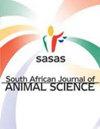饲粮中添加酵母肽对鹅营养物质消化率、生长性能和血液代谢产物的影响
IF 0.6
4区 农林科学
Q3 AGRICULTURE, DAIRY & ANIMAL SCIENCE
引用次数: 0
摘要
本试验旨在研究添加酵母肽对鹅生长性能、营养物质消化率和血液代谢产物的影响。选取1日龄四川白鹅(n = 300, 95.16±1.98 g),随机分为饲粮中添加0(对照)、100、200、300和400 mg/kg商品酵母肽产品的5个处理组。与对照组相比,饲粮中添加200 mg/kg酵母肽显著提高了饲料系数、体坡长、半净膛率和磷的表观消化率。随着饲粮酵母肽添加量的增加,胸宽、胴体率、血清甘油三酯和高密度脂蛋白呈线性增加。平均日增重、骨盆宽度、半潜深、低密度脂蛋白和总能消化率随饲粮酵母肽添加量的增加呈二次响应,其中200 mg/kg和300 mg/kg饲喂水平效果最好。由此可见,饲粮中添加酵母肽可提高生长性能,并影响营养物质消化率和血液代谢物,本研究以酵母肽添加量为200 mg/kg和300 mg/kg时效果最佳。本文章由计算机程序翻译,如有差异,请以英文原文为准。
Effect of yeast peptide dietary supplementation on nutrient digestibility, growth performance, and blood metabolites in geese
A study was conducted to evaluate the effect of yeast peptide supplementation on growth performance, nutrient digestibility, and blood metabolites in geese. One-day-old Sichuan white geese (n = 300, 95.16 ± 1.98 g) were randomly assigned to five dietary treatment groups containing either 0 (control), 100, 200, 300, or 400 mg/kg commercial yeast peptide product. Compared with the control, dietary supplemental yeast peptide at 200 mg/kg substantially improved feed conversion ratio, body slope length, half-eviscerated percentage, and the apparent digestibility of phosphorus. With the increase in dietary yeast peptide, breast width, carcass percentage, serum triglyceride and high-density lipoprotein increased linearly. The average daily gain, pelvis width, half-diving depth, low density lipoprotein, and digestibility of gross energy exhibited quadratic responses with the increase in dietary yeast peptide, with the 200 mg/kg or 300 mg/kg feeding level being the most effective. It can be concluded that dietary supplementation of yeast peptides improves growth performance and affects nutrient digestibility and blood metabolites, which were optimized at 200 mg/kg or 300 mg/kg of yeast peptide in the present study.
求助全文
通过发布文献求助,成功后即可免费获取论文全文。
去求助
来源期刊

South African Journal of Animal Science
农林科学-奶制品与动物科学
CiteScore
1.50
自引率
0.00%
发文量
39
审稿时长
>36 weeks
期刊介绍:
The South African Journal of Animal Science is an open access, peer-reviewed journal for
publication of original scientific articles and reviews in the field of animal science. The journal
publishes reports of research dealing with production of farmed animal species (cattle, sheep,
goats, pigs, horses, poultry and ostriches), as well as pertinent aspects of research on aquatic
and wildlife species. Disciplines covered nutrition, genetics, physiology, and production
systems. Systematic research on animal products, behaviour, and welfare are also invited.
Rigorous testing of well-specified hypotheses is expected.
 求助内容:
求助内容: 应助结果提醒方式:
应助结果提醒方式:


